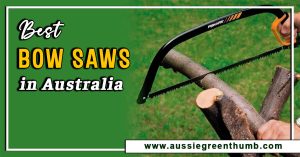A cement mixer doesn’t always need to be a bulky, petrol powered, barrel, but depending on the task, sometimes bigger is better.
Cement mixers are great for much more than just mixing cement, so if you’re wondering whether it’s worth investing, check out our reviews and buyer’s guide to cement mixers for everything you need to know.
More...
Top Pick

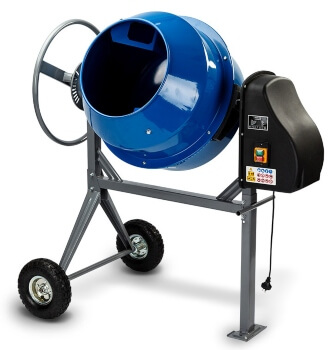
Best Cement Mixers in Australia
Product | Our Rating | Price | |
|---|---|---|---|
1. Baumr-AG 135L Portable Electric Cement Mixer | 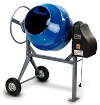 |  | |
2. Baumr-AG 220L Portable Electric Cement Mixer | 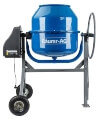 |
Cement Mixers Buyers' Guide
What is a Cement Mixer?
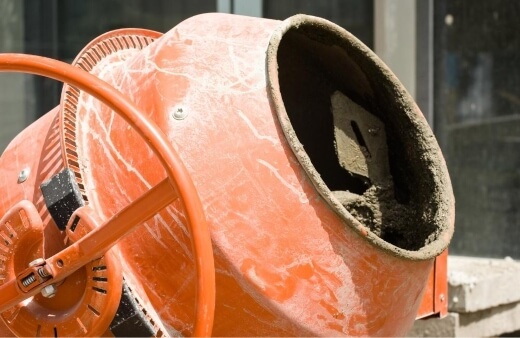
Cement mixers are rotary tools, usually barrels, which evenly and steadily combine wet and dry materials together. While they are designed specifically for cement, they are ideal for mortar and various rendering materials too.
The idea of a mixer is to agitate dry mixtures to allow enough water and air into the mix for an even cure. Mixing by hand can do the same job but is heavy work, and often produces stale mixes that cure slowly, or without thoroughly bonding when set.
When to Use a Cement Mixer?
If you’re planning on relaying patios, rendering walls, or repairing steps it’s well worth investing in a cement mixer or renting one for the week at least.
If you regularly need to prepare cement or mortar, then barrel mixers are a pretty essential part of your job, and finding the best cement mixer is important.
For most domestic tasks, there are other types of cement mixers which are more compact, easier to store, and generally a little bit more budget-friendly.
We’ll look at how to choose the right one in our buyer’s guide below.
What to Look for When Buying a Cement Mixer
There are just three things to consider when buying a cement mixer, other than obvious quality and cost considerations; capacity, weight, and power source.
There’s no real advantage to choosing a particularly powerful cement mixer, as they do a simple task, and will work well within their set capacity. So, let’s take a look at how to choose the right specs for your new cement mixer.
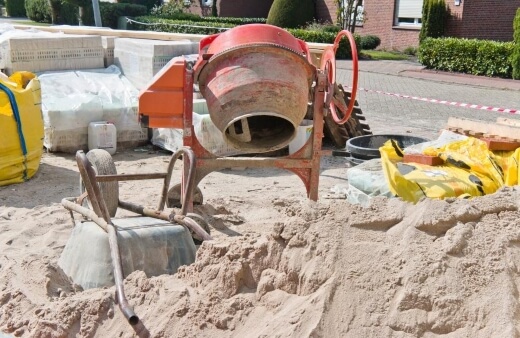
Capacity
Capacity is the most important consideration with any cement mixer and is directly linked to size, weight, and the potential uses. Most domestic uses (relaying steps, or re-rendering walls) can be done with a 90L cement mixer. Anything more will just mean that your cement goes off before it’s applied.
Remember that cement has a set curing time. It might not be set in the barrel, but it will fail to adhere properly and may crack after application if you do too much at once.
For commercial building sites, with a few brickies on hand, 100-200L is enough mixing capacity to work through at a time.
Weight
It might seem obvious, but it’s essential to choose a cement mixer that’s reasonably portable. For domestic use, it’s potentially less important, as you won’t need to travel with it, but for working on site you’ll need a mixer that stores well in the van and is free-standing when you get there.


Get Your Free Guide:
Master Growing Australian Natives eBook
A Must Have Complete Guide for Every Australian Garden
Get Your Free Guide:
Master Growing Australian Natives eBook
A Must Have Complete Guide for Every Australian Garden
Power Source
Rather than power ratings, which can be confusing at the best of times, focus on power source. For domestic work, a corded electric cement mixer is the best choice, giving you flexibility and easy access to power.
For remote working, you’ll need either petrol or battery-powered cement mixer, unless you plan on carting a generator around with you too.
Different Types of Cement Mixers
Perhaps the biggest variation to consider when choosing the best cement mixer for you has to be between barrel mixers and mixing rods.
Mixing rods are ideal for small jobs, and take up far less space, but they produce a less even mix, and are much more reliant on you and your skills than a barrel mixer.
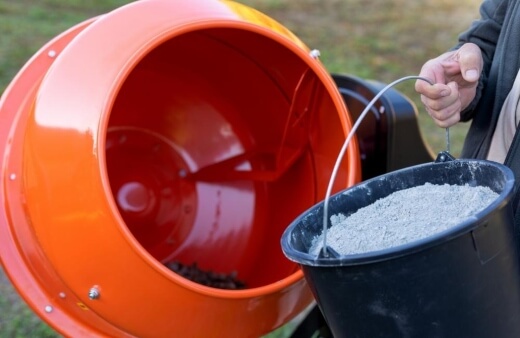
Barrel mixers are bulky, but they are reliable too. The two major factors to consider are storage, and how often you’re realistically going to use it. If it’s for a one-off, non-structural job, go for a mixing rod.
You’ll get a reasonable consistency even if it’s your first time, and you won’t be stuck with a huge barrel taking up garage space. If you’re a pro, there’s no choice but to get a barrel mixer as it will save you time and effort in the long run.
How to Use a Cement Mixer
Cement mixers are intuitive tools that take very little training to use. However, there are a few basic rules:
- Never overload your mixer.
- Add water, then cement/mortar based on the material guidance on the bag.
- Allow the mixer to mix until everything is thoroughly combined and no dry powder remains.
- Once it’s mixed, keep your cement mixer moving (easier with barrel mixers).
- Turn the barrel off briefly, then remove an amount you know you can work with, either into a wheelbarrow or a bucket. (Click here and see our review of the best wheelbarrows for 2025).
- Turn the mixer back on while you work to extend the setting time of the mix in the barrel (constant agitation extends the mixture’s working time).
- When the mixer is empty, rinse it out (the old mix will have begun curing on the sides and can set off new mixes.
- Add a fresh mix.
- Repeat.
- Clean all of your equipment immediately after use.
Cement Mixer Safety Guide
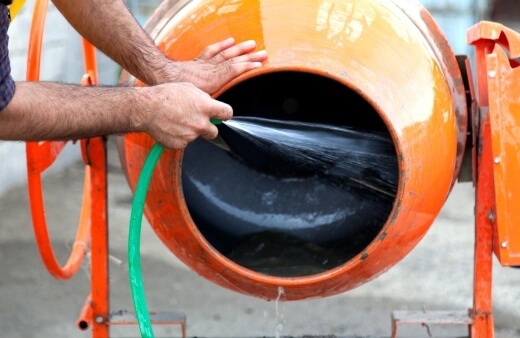
Cement mixers are fairly safe power tools, but that doesn’t mean you can forget about safety altogether.
- Always set your mixer on a level surface, or level the ground before turning it on.
- Avoid using electric mixers in the rain, or cover them over to prevent sockets and batteries from getting wet.
- Tie back long hair, especially when filling or emptying a moving barrel. Secure any jewellery or clothing that might catch too.
- Wear a protective mask too, as the initial mix can get incredibly dusty and is not safe to inhale.
Cement Mixer Reviews
1. Baumr-AG 135L Portable Electric Cement Mixer

Source: edisons
This 135L portable cement mixer from BAUMR-AG is really well put together, with strong welds creating sturdy and reliable missing paddles inside the drum, and tough pneumatic tyres to cope with bumpy ground.
Like all BAUMR-AG cement mixers, the stand needs to be set up level at all times, but the adjustable front leg makes that easy.
Pros
Cons
2. Baumr-AG 220L Portable Electric Cement Mixer
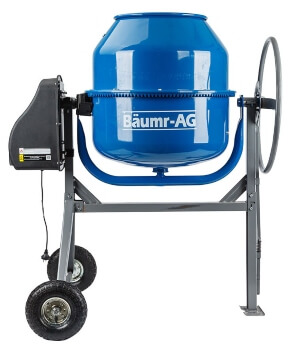
Source: edisons
BAUMR-AG’s portable electric concrete mixer is designed to withstand the higher impact and uneven materials associated with concrete as well as plain cement. It’s lightweight, easy to move, and stores away easily, making it ideal for less regular users, or DIYers.
The 220L barrel is massive compared to anything else in its price range, making it a great choice for anyone who needs convenience without the power.
The downside? Well, there aren’t many, but we would recommend only using this cement mixer on perfectly level ground as it isn’t particularly well balanced.
Pros
Cons
Cement Mixer Top Pick for 2025
Best Cement Mixer - Our Top Pick


Source: edisons.com.au
The best cement mixer for most users, or the most versatile at least, has to be the Baumr-AG 135L Portable Electric Concrete Mixer. Its wide paddles create a perfectly even mixture every time, and its powerful motor makes it reliable too.
The Baumr cement mixer is ideal for anyone on a budget, or looking for a simple high-capacity mixer for on-site use that can afford to be bashed around a bit.
Cement Mixer FAQs
What’s the difference between cement and concrete mixers?
Cement mixers and concrete mixers are the same tool. They combine wet and dry materials evenly by agitating the ingredients. Concrete is a mix of sand or gravel with cement and water, producing a less even but more cost-effective solution for flooring, or securing fence posts.
How long should you mix cement in a cement mixer?
Mix cement for around 5 minutes until the entire mix has one uniform texture. Add more water, or more cement in small amounts once the whole lot is mixed to achieve the desired consistency.
How do you mix cement without a mixer?
Mixing cement without a mixer is not advisable, but it is possible. You’ll need a bucket at least twice as big as the amount of cement you need to mix, a very sturdy trowel, a mask and gloves.
Add water into the bucket, and then add the equivalent amount of cement powder. Mix until it is completely even, pulling up any dry powder at the bottom of the bucket into the mix. Most importantly, be patient, and keep agitating the mixture.
Do you need a cement mixer for postcrete?
Postcrete, or post-setting concrete, also called fast-setting concrete, does not need a cement mixer to work. Once your hole is dug, fill it with water until it stops draining and the walls of the hole are saturated.
Then pour the dry concrete into the hole and fill it with water. Excess water will drain out so you don’t need to be precise.
Looking for more tools for your next DIY project? We have a variety of tools reviewed so be sure to check our buying guides below:
Get the Best Cement Mixer for the Job
Whether you buy or rent it, a cement mixer will not just improve productivity, but actively improve the quality of your work. For smooth, workable cement mixtures in any circumstance, finding the best cement mixer for your job is important.
I hope we’ve managed to help you choose the best cement mixer for your job, but remember, it’s not all about power with these bulky power tools. Choose something durable, reliable, and no bigger than you need.
Published on August 24, 2022 by Gary Clarke
Last Updated on December 27, 2024

